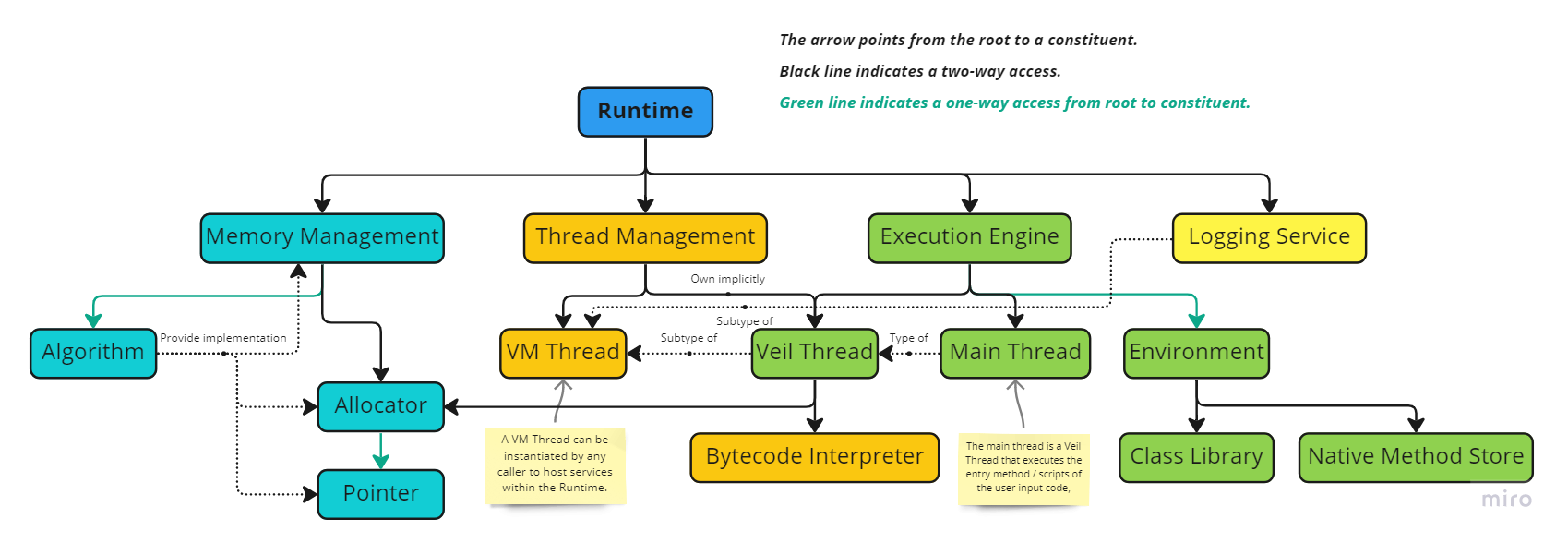https://github.com/alphaharrius/veil
The implementation of the Veil programming language.
https://github.com/alphaharrius/veil
cpp cpp17 custom-language language-runtime programming-exercises programming-language
Last synced: 10 months ago
JSON representation
The implementation of the Veil programming language.
- Host: GitHub
- URL: https://github.com/alphaharrius/veil
- Owner: Alphaharrius
- License: gpl-3.0
- Created: 2022-08-07T04:46:11.000Z (over 3 years ago)
- Default Branch: master
- Last Pushed: 2023-03-22T05:26:29.000Z (almost 3 years ago)
- Last Synced: 2025-01-29T12:29:21.731Z (12 months ago)
- Topics: cpp, cpp17, custom-language, language-runtime, programming-exercises, programming-language
- Language: C++
- Homepage:
- Size: 335 KB
- Stars: 1
- Watchers: 1
- Forks: 0
- Open Issues: 0
-
Metadata Files:
- Readme: README.md
- License: LICENSE
Awesome Lists containing this project
README
# Veil
Veil is planned to be a gradually typed, and multi-paradigm programming language supports both object-oriented & functional programming.
This project serves as an exercise on ```C++``` and a way to learn how a programming language with a runtime could work under the hood.
My current goal of this project is to complete the runtime, then implement a simple compiler in whatever language I feel comfortable in
(```Python``` or ```Java```), and re-implement the compiler in Veil language as a proof of principle.
Ofcoz there is a much harder quest to implement a just-in-time compiler targeting branches (or I should say it is a trace JIT), which
based on a exposed compiler interface in the runtime, so that we can support any type of compiler backend. The JIT will most likely be
built with a language with memory-safety, maybe in ```Rust``` or even in ```Veil``` itself...
## The Fabric runtime
The Fabric runtime is for running the Fabric bytecode generated by a compiler from the Veil code, and is implemented
by C++, is designed from the ground up to support multi-threaded environment. And to be fully embeddable into other ```C++```
projects, there will be no globally defined states.
To keep the code structure as clear as possible, I planned to use the fully power of OOP provided by ```C++```, and leave all rooms of
performance enhancements & optimizations to the JIT compiler.
Future prospects includes adding a JIT compiler, rewrite part of the VM service code base using Veil... etc.
### Structure Diagram

### Naming conventions
- Namespaces: ```lowercase``` single word.
- Class: ```CamelCase```
- Methods: ```snake_case```, with single words for public action methods; multi-word for private methods or methods
that are not supposed to be used or exposed outside of class scope.
- Variables: ```snake_case``` and better to be verbose with at least one ```_``` to avoid collision with comments.
- Attributes: ```snake_case``` and better to be verbose with at least one ```_``` to avoid collision with comments.
- Constants: ```ALL_CAPS``` and use keyword ```const``` but not macros.
- Structs: ```CamelCase``` as a multi-part wrapper; ```snake_case_t``` as a primitive capsule.
- Macros: ```CamelCase```
- Labels: ```CamelCase```
### Code structure
- Integer like types in the code should use the ```typedef``` defined types in ```fabric/src/typedefs.hpp```.
- All error code of the VM runtime should be type ```uint32``` and reside in a namespace specific for their usage, and
defined only in ```fabric/src/errors.hpp```.
- Except for special header files, all code under a subdirectory of ```fabric/src``` should be defined in a
specific ```namespace```.
- All native or OS related platform specific code of a subdirectory of ```fabric/src``` should all be placed
within ```os.hpp``` & ```os.cpp```, and reside in the namespace of ```veil::os```.
- Platform specific methods under the namespace of ```veil::os``` should all contain an error return
parameter: ```some_native_method(..., uint32 &error)```.
- All ```class``` that will be part of the VM structure should either be a subtype of ```HeapObject```
, ```Arenaobject``` or ```ValueObject```.
### Implementation roadmap
1. [ ] Implement utility structures.
- [ ] ```ArrayList```
2. [ ] Implement the memory management.
- [x] Implement the core modules.
- [x] ```Management```
- [x] ```Pointer```
- [x] ```Allocator```
- [x] Interface of ```Algorithm```
- [ ] Implement the standard management algorithm.
3. [ ] Implement all encapsulations of OS specific threading primitives.
- [ ] ```Thread```
- [x] Implement the basic encapsulations.
- [x] Able to execute a ```VMService```.
- [ ] Priority settings for all OS threads.
- [x] ```Mutex```
- [x] ```ConditionVariable```
- [x] Atomics
- [x] Add handling for spurious wakeup of ```ConditionVariable```.
4. [x] Implement VM specific threading primitives.
- [x] A low object memory footprint queue-based thread synchronization primitive ```OrderedQueue```.
5. [x] Exchange all existing usage of `````` and `````` to the encapsulations.
- [x] ```OrderedQueue```
6. [ ] Implement the thread management.
- [x] All management's functionality should be protected by a mutex.
- This is a legacy requirement, since the management (aka. scheduler) is running a single threaded loop to process
all thread controls.
- [x] Service spawning & termination using the underlying thread.
- [x] Thread sleep & wake.
- [x] Thread interrupt.
- [x] Thread pause & resume.
- [ ] ```VMService``` joining with another ```VMService```.
- [x] Scheduler termination.
7. [ ] Implement the Veil execution environment.
- [ ] Design the Veil VM bytecode specifications.
- [ ] Implement the Veil bytecode interpreter.
- [ ] Implement ```VeilThread```.